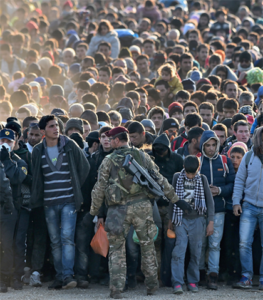Anti-migrant sentiments a question of perception – study says
You might think xenophobia would be strongest among populations where there are large concentrations of new migrants and among people who have most contact with them.
But a new study from Europe shows exactly the opposite is true.
Data from the European Social Survey (ESS) – a bi-annual survey of Europe’s societies and people’s attitudes conducted since 2002 – found that it is not the presence of migrants, as such, that generates anti-migrant sentiments.
In fact, anti-migrant feelings are strongest in countries with very few migrants. Similarly, on an individual level there is a strong negative correlation between high-levels of personal contact with migrants and positive attitudes, the study found.
The ESS data showed that general societal processes are more likely to shape attitudes: the level of trust in one another and in state institutions, the perception of social cohesion and the feeling of safety.
“We found that individuals who rejected migrants, extremely and homogeneously, did not differ in demographic characteristics from the rest of the population,” ESS researchers Dr Vera Messing and Bence Sagvari said.
“Where they did differ was in their subjective perceptions of control: to a much greater extent, they feel they have financial difficulties, are alienated from politics, lack trust and hold security-focused, individualistic values,” the researchers said.
“All in all, people who feel politically disempowered, financially insecure and without social support are the most likely to become extremely negative towards migrants,” they said.
Looking at how attitudes changed over produced a similar pattern.
The data found those countries in which people are more trusting of public institutions, and more satisfied with the performance of their governments, democratic institutions and national economies, are the most likely to be more accepting of migrants.
Higher level data looking across all of the 20 countries in the survey found a neutral body of opinion.
Europeans, on average, saw advantages as much as disadvantages in migration and weighted them equally.
Not even big shocks in Europe, such as the economic crisis starting in 2008 or the ‘refugee crisis’ of 2015, have changed this view significantly, the researchers said.
Based on country averages, attitudes to migration have become slightly more positive since 2015, they said.
“Taking into account data from 20 countries participating in the European Social Survey, the share of those unconditionally rejecting anyone arriving from poorer countries outside Europe to settle in their country dropped from 15 per cent in 2014-15 to 10 per cent in 2016-17,” the researchers said.
Europe has become more split in terms of how people evaluate migration. In the Nordic countries, the Iberian Peninsula, Belgium, France and Germany acceptance of migrants has stayed unchanged or even become more widespread since 2015, the study showed.
But in the post-communist countries of Eastern Europe, where attitudes towards migration were already more negative than in the rest of Europe, people have generally become even more rejecting of migrants, it showed.
Lead researcher Dr Messing said Europeans were experiencing a tectonic shift in the growth of populism and xenophobic political and public discourse in Europe and its wider environment.
“Presenting migration as an exaggerated threat to Europe’s societies is key to the populist narrative: one of the main topics polarising Europe’s political landscape is the evaluation of migration and its consequences for domestic economies and societies,” Dr Messing said.
“Populist anxieties over migration are rooted in real concerns but they stem from a different source: certain theories explain pro- and anti-migrant attitudes in terms of the perception of control,” she said.
“Citizens who believe they are personally responsible for what happens in their lives, and who are thus capable of effecting change in their lives and the wider society, are less hostile towards immigrants.
“These citizens are less likely to feel threatened by their changing social milieu,” Dr Messing said.
“Individuals who feel that the government and other relevant institutions are in control of the social and economic processes in the country, including migration—both its inflow and the inclusion of migrants—are likely to find migration less threatening.
“And integration itself has a positive impact: those who feel migrants are agents of their social integration and (have the potential to) become contributing members of society will be less likely to feel threatened by migration and thus to reject migrants in general.
“In short, perceptions of control—as applied to citizens, the government and immigrants—have an important impact on attitudes toward immigrants,” Dr Messing said.
Laurie Nowell
AMES Australia Senior Journalist












